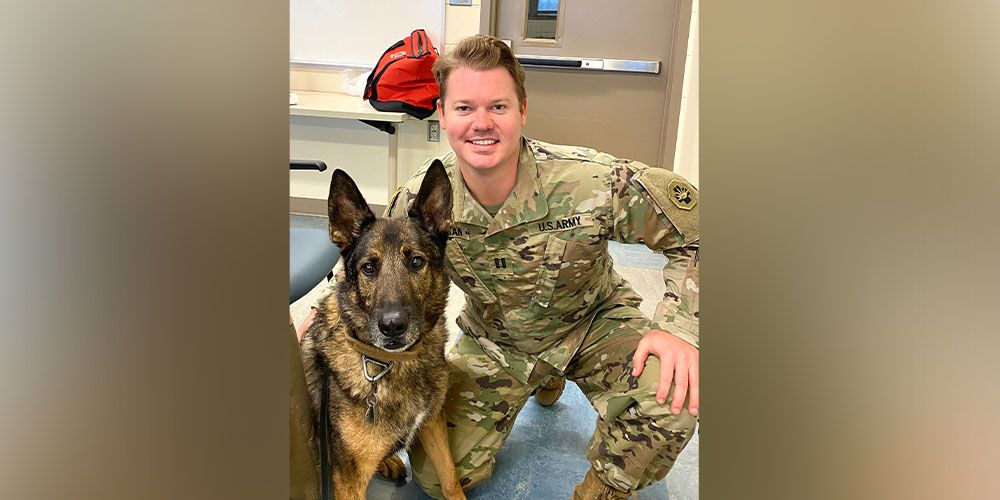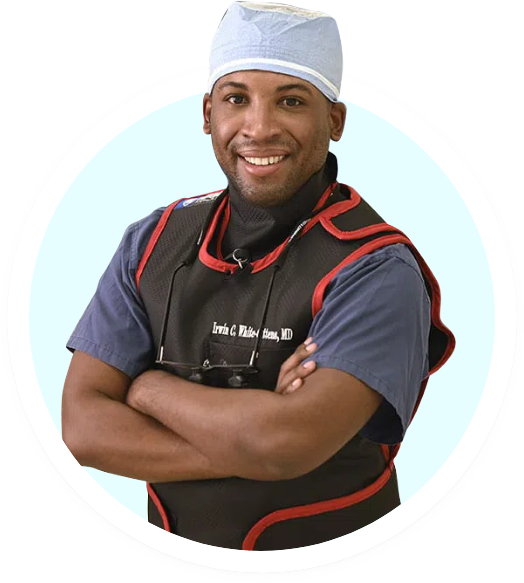Whether performing complex procedures in an operating room or caring for military working dogs overseas, Matthew Morgan, DVM ’11, is guided by a strong commitment to service in all areas of his work.
A graduate of St. George’s University’s School of Veterinary Medicine, Dr. Morgan serves as chief of surgery at VERG Brooklyn, a 24-hour veterinary specialty hospital in the heart of Brooklyn, NY. He is also a major in the United States Army Veterinary Corps and recently returned from deployment in the Middle East, where he provided life-saving care to service animals in high-risk environments.
“I love the intersection of precision, compassion, and purpose that defines both sides of my career,” he said.
In 2021, Dr. Morgan was presented with the Army Commendation Medal for serving as acting commander of the 147th Medical Detachment Veterinary Service Support during the early part of COVID (February to October 2020).
“Leading the unit during that time was a tremendous responsibility, and it meant a great deal to be recognized for supporting the mission and the care of our military working dogs,” he said.
Driven by a lifelong passion for animal health and a commitment to excellence, he is also dedicated to mentoring future veterinary surgeons and advancing the field through innovation and research. Read more about Dr. Morgan’s journey from veterinary student to veterinary surgeon.
SGU: Tell us about your current role. What gets you up in the morning to go to work?
Dr. Morgan: In my civilian career, what gets me up in the morning is the opportunity to make a difference every day—whether it’s helping a working dog return to duty or performing a complex surgery that restores quality of life to a beloved pet.
I recently returned from a six-month deployment to the Middle East, where I served as the attending veterinarian for all US and partner force military working dogs in the region. Caring for our nation’s military working dogs is both a profound responsibility and a privilege. It gives me immense pride to serve those who serve, and to give back to my country using the skills I first began developing at SGU.
SGU: What made you pursue being a veterinarian? Why do you love your specialty?
Dr. Morgan: I’ve wanted to be a veterinarian for as long as I can remember. I don’t think I ever seriously considered anything else. From trips to the zoo as a toddler to caring for my first pet, I’ve always felt a strong connection to animals and a desire to help them.
I chose to specialize in surgery because of the immediate and tangible impact it can have. There’s something incredibly fulfilling about being able to fix a fractured leg, remove a life-threatening tumor, or restore a pet’s quality of life through a complex procedure. The precision, problem-solving, and hands-on nature of surgery drew me in, and the ability to make such a meaningful difference keeps me going. It’s not an easy path—long nights and years of residency training were part of the journey—but the reward of helping animals heal makes it all worth it.
SGU: How do you hope to contribute to the field of veterinary medicine?
Dr. Morgan: My long-term goals include helping train the next generation of veterinary surgeons, not only by passing on technical skills, but also by fostering the confidence, curiosity, and critical thinking that make great surgeons. I’m also deeply committed to advancing the field itself by continuing to expand the surgical capabilities we can offer to patients through innovation, collaboration, and research.
Another passion of mine is continuing my work with military working dogs. These incredible animals serve alongside our troops in high-stakes environments, and they deserve the same standard of medical care as their human counterparts. I hope to be part of the ongoing effort to ensure they receive the recognition, protection, and medical support they’ve earned through their service.
SGU: How did SGU help you achieve your dream of becoming a veterinarian?
Dr. Morgan: SGU gave me the foundation I needed to succeed as a veterinarian. I graduated with a strong knowledge base and felt fully prepared to enter clinical practice and compete for a highly sought-after surgical residency.
With so few slots and so many qualified applicants, pursuing a residency in surgery is incredibly competitive. You have to be well-trained and confident in your abilities to even be considered. SGU gave me that preparation and confidence. It helped shape not only my clinical skills but also my resilience and work ethic, both of which have been critical in my career and my pursuit of a challenging specialty.
SGU: Why did you choose SGU?
Dr. Morgan: I chose SGU because it felt like the best of both worlds—a high-quality, AVMA-accredited veterinary school in one of the most beautiful places on earth. I’ve always loved the Caribbean. I’m a passionate scuba diver and had spent time sailing and diving on different islands before vet school, so the idea of studying in a place like Grenada felt like a dream come true.
What really sold me, though, was SGU’s strong reputation. I kept hearing about SGU grads doing amazing things all over the country. It made me feel confident that I’d get the education I needed to chase my goals—no matter how big.
SGU gave me the foundation, the support, and the experience to take on a really competitive specialty and to build a career I’m proud of. Getting to dive with Dive Grenada on the weekends definitely didn’t hurt either!
SGU: Which, if any, student organizations did you take advantage of at SGU?
Dr. Morgan: At SGU, I was actively involved in the surgery club, which gave students the opportunity to perform spays and neuters on local pets around the island. While all students had chances to participate in these procedures, being a member of the surgery club meant more frequent and advanced opportunities to operate, which really helped me build my skills.
This hands-on experience was invaluable. Not only did it allow me to give back to the community in Grenada, but it also helped me sharpen my surgical skills well beyond what many of my peers experienced at US veterinary schools. The club also offered extra wet labs and guest speakers, which helped me build a strong professional network and confirmed my passion for surgery. Getting that extra practical training and mentorship early on really boosted my confidence and prepared me for the demands of a surgical residency and my career.
SGU: What has been a particularly memorable, rewarding, or challenging experience in your career so far?
Dr. Morgan: One of the most memorable experiences in my career involved a colleague’s dog, Rosie, who developed a mesenteric torsion through a previous diaphragmatic hernia—a life-threatening condition that often proves fatal if not treated immediately. I was called in overnight, and we operated through the night to save her. It was an intense, high-stakes situation that required close collaboration with the critical care team. Thanks to everyone’s effort and Rosie’s incredible strength, she pulled through and beat the odds. Moments like that remind me why I love this field—being able to make a real difference when it matters most.
SGU: Have you participated in any research that you would like to share?
Dr. Morgan: I’ve authored several papers focused on canine stifle surgery, an area I’m especially passionate about. Most recently, I’ve been involved in research on a novel motor-sparing locoregional nerve block technique for stifle surgery in dogs. The goal is to improve pain management while allowing for an earlier return to function, which we believe will lead to better long-term outcomes. It’s exciting to contribute to what could become a new standard of care in orthopedic surgery.
SGU: Why would you recommend SGU to an aspiring vet student?
Dr. Morgan: I highly recommend SGU to any aspiring veterinary student who’s ready to rise to the challenge. SGU offers everything you need to succeed—a rigorous curriculum, top-notch facilities, and, most importantly, a faculty that truly cares. Some of the most passionate and dedicated professors I’ve ever learned from were at SGU, and many of them are still there today, creating the next generation of veterinarians. Their mentorship, support, and genuine love for teaching left a lasting mark on me and played a big role in shaping the veterinarian I am today.
–Published July 2025


